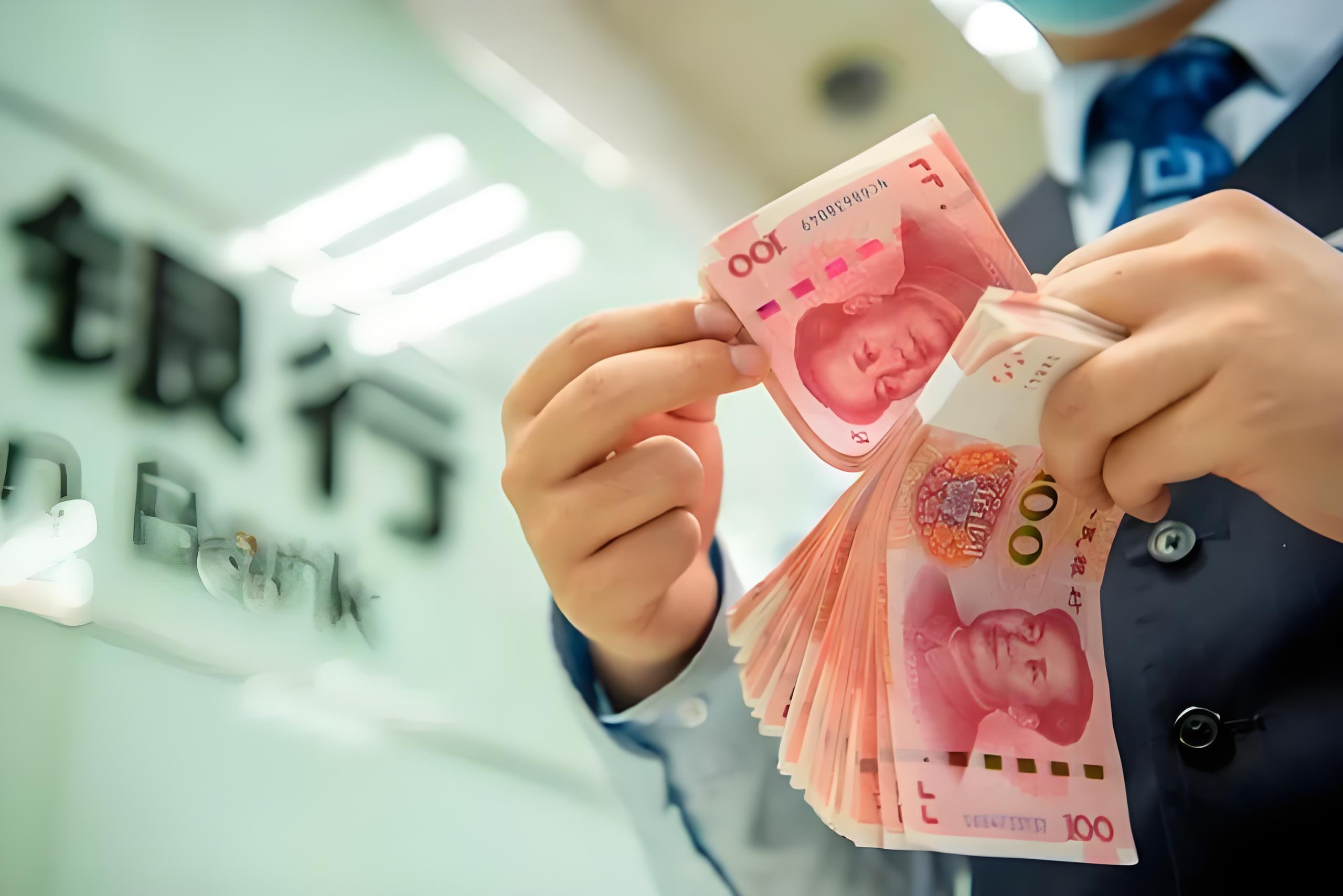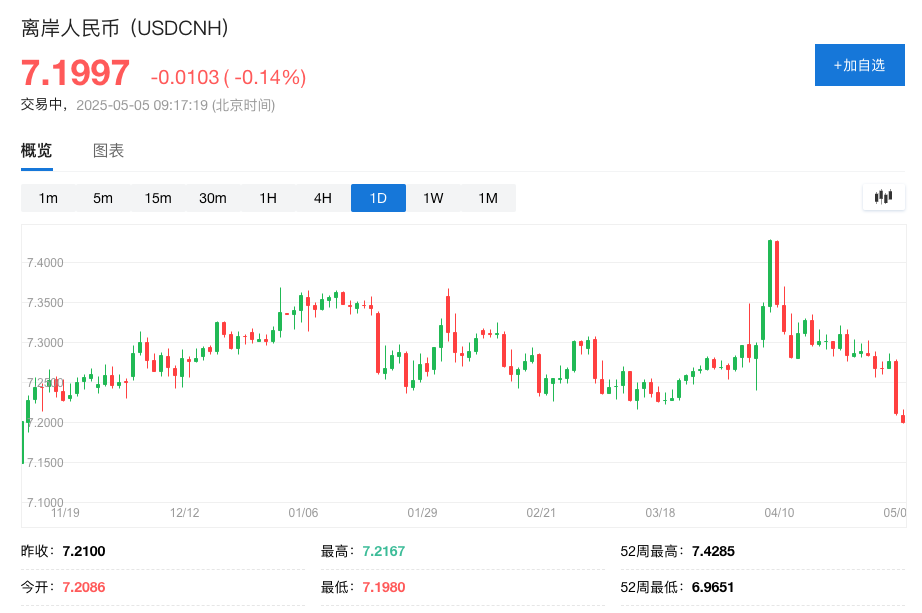
The offshore renminbi rose above the 7.20 mark against the dollar for the first time since November last year, rising more than 130 points in a day.

The strong performance of the RMB and the A50 index will see what positive factors are driving behind it.
Why the sudden surge?
As recently as May 2, the offshore renminbi suddenly soared nearly 1% against the US dollar. Immediately after, it continued to soar after today's open. In just two trading days, the maximum increase in RMB is close to 900 points! At the same time, the A50 index has also performed well, rising more than 1.5% in the last two days.
So, why is this market so strong? Jingtai believes that there are four main reasons:
1. May Day travel data hit a new high, and the economic momentum increased
First of all, during the May Day holiday just past, the number of travelers and consumption data across the country have refreshed a record high. Whether it's a domestic trip or an outbound trip, everyone has a great time! This strong consumption data means that more economic growth momentum is being injected and the market is more optimistic about the future economic outlook.
2. China-US economic and trade consultations have released positive signals
Second, there seem to have been many positive signals from the economic and trade consultations between China and the United States during the May Day period. While the details have yet to be announced, the market's reaction says it all – investors are looking forward to an improvement in relations between the two countries. After all, there will be less trade friction and the global economy will be more stable, which is a big positive for the yuan and the stock market.
3. Hedging funds are allocated to RMB assets
Third, the global situation is becoming more uncertain, and many safe-haven funds are beginning to look for "safe havens". Due to its relatively stable performance, RMB assets have become the first choice of many investors. In other words, more and more money is flowing into RMB assets, which is also driving up the RMB exchange rate and the performance of the A-share market.
4. The U.S. dollar index fell, and the foreign exchange settlement was gradually released
Finally, the U.S. dollar index has continued to weaken recently, trending down. Against this backdrop, businesses and individuals holding US dollars may feel that now is a good time to settle foreign exchange and exchange their US dollars for RMB. As a result, the demand for foreign exchange settlement has increased, which has further promoted the appreciation of the renminbi.
The "small explosion" of the RMB and the A50 index
Remember May 2nd? The USD/CNH rushed to 7.2790 that day, and it looked a bit tense. But unexpectedly, there was a "big reversal" of the RMB on the same day, and the exchange rate plummeted (that is, the RMB appreciated) by nearly 1%.
As soon as the market opened the next day, the RMB continued to exert force, and the highest once rushed to 7.1893, and it rose by nearly 900 basis points in two days!
This wave of rise directly recovered the position lost by the RMB after the so-called "reciprocal tariff" announced by the United States on April 2!
Although A-shares are on holiday, the A50 index, which represents China's core assets, is not idle. In the last trading day, it rose by almost 1%, and today it rose by more than 0.7%, which is quite a bright performance.
What's more worth mentioning is that the U.S. stock market is not very strong during this time. Nasdaq futures fell more than 1%, S&P 500 futures fell 0.8%, and Dow futures also fell about 0.7%, and global market sentiment was cautious.
However, in this context, the A50 can still buck the trend and strengthen, indicating that foreign investors' confidence in Chinese assets is quietly heating up.
Foreign investors buy RMB bonds
According to data from the Shanghai Clearing House, the pace of foreign investors increasing their holdings of RMB bonds continues to accelerate in the context of heightened volatility in global financial markets and rising risk aversion. From April 1 to 18, the scale of net foreign purchases of RMB bonds increased significantly, reaching a staggering US$33.2 billion!
Why do foreign investors like RMB bonds so much?
China's macroeconomic stability: China's economic fundamentals are sound, the policy environment is predictable, and the exchange rate remains stable.
Low volatility and high certainty: RMB bonds have the characteristics of low volatility and high certainty, making them an important choice for global investors to optimize asset allocation and achieve risk hedging.
Since 2025, risk aversion has become the main driving force for foreign investors to increase their purchases of RMB bonds since April. Specifically:
Increased uncertainty over tariff policy: Due to the uncertainty of tariff policy, US dollar assets suddenly changed from a "tariff premium" transaction in the fourth quarter of last year to a "tariff discount" transaction, which frequently triggered the "triple killing" of US dollar assets.
Funds to cover safe-haven assets: Against this backdrop, funds have begun to cover safe-haven assets with more stability and certainty, and RMB bonds have regained their role as a "safe haven" during the pandemic-stricken period in 2020.
According to the data of the first quarter, the cumulative surplus of securities investment reached 4.273 billion US dollars, of which the monthly surplus in March reached 1.793 billion US dollars. This shows that foreign investors continue to increase their allocation to Chinese bonds.
On the other hand, since the official start of Trump's second term, his extreme tariff propositions and overt interference in the Fed's monetary policy have had a huge impact on the global trade rules system and the dollar's status as a world currency. The U.S. dollar index has seen a rare two rounds of sharp depreciation in the opposite direction of real interest rates since March.
With the weakening of the US dollar, the demand for foreign exchange settlement has also become one of the main reasons for the rise of the RMB. Enterprises and residents have shown the characteristics of "high demand for foreign exchange hoarding and declining tendency to buy foreign exchange", and "foreign exchange hoarding" is still the main line of funds for RMB exchange rate fluctuations this year.
Under the circumstance that the known tariff policy risks in 2025 have not yet been fully implemented, the scale of the pending exchange settlement may continue to expand, forming a capital portfolio of "rushing exports to push up the volume of foreign exchange settlement + depreciation concerns to push up the pending foreign exchange order". If the external environment develops in the direction of continuing to be bullish on non-US currencies, the US dollar index confirms that it continues to be in a state of "weak dollar", pending the settlement of the exchange rate or gradually released.
To sum it up:
Foreign investors continue to buy RMB bonds: Because of their low volatility and high certainty, RMB bonds have become the first choice for safe-haven assets.
Heightened risk aversion: U.S. dollar assets underperformed due to tariff policy uncertainty, and funds turned to renminbi bonds for safe-haven purposes.
Weaker U.S. Dollar, Renminbi Appreciation: The U.S. dollar index has depreciated sharply, and the demand for foreign exchange settlement has risen, further pushing up the renminbi exchange rate.





